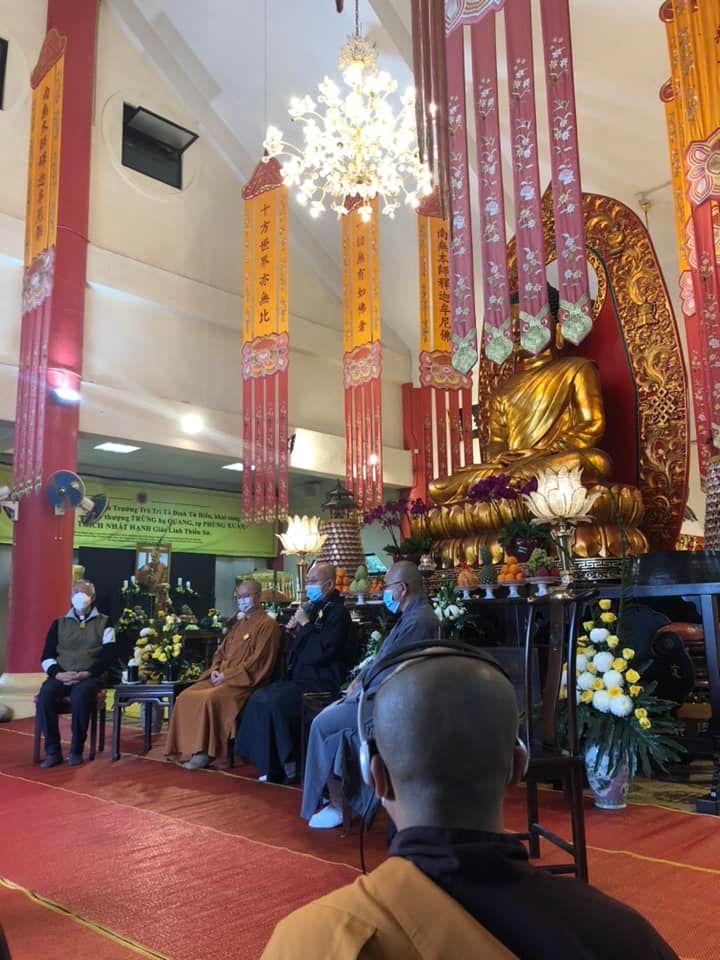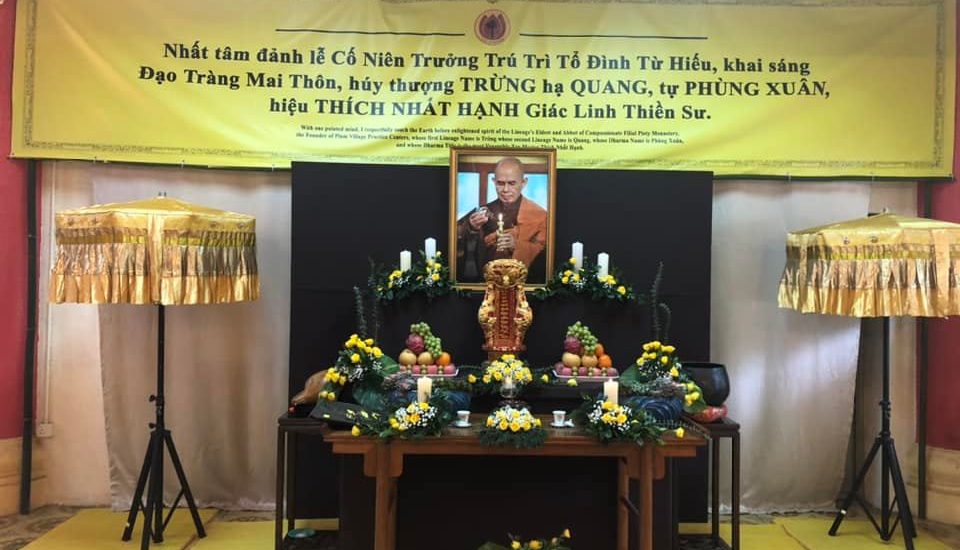No one can predict the time of one’s passing. More accurately, no one can predict when one dissolves into the bloom of a flower, or returns to the sky as a cloud that is beyond creation and destruction. It was therefore natural that the Hong Kong Buddhist community’s commemoration for Thich Nhat Hanh on the 24th was on short notice, with a relatively small group. The monastics of the Asian Institute of Applied Buddhism at Lotus Pond Temple, along with members of Hong Kong’s Wake Up chapter, hosted a commemorative gathering with Ven. Jingyin, Ven. Hin Hung, Ven. Thong Hong, and the Catholic Father Kwan Tsun Tong Thomas. Between them, the four religious leaders reflected on the life of Thay and the impact of his teaching and philosophy, which have been interwoven into the fabric of Hong Kong Buddhist life since the 2000s.
All over Hong Kong, there are institutions and leaders of diverse lineages that were touched by his nobility, compassion, and gentleness. Ven Jingyin, who is the abbot of Po Lin Monastery and has been involved with Hong Kong Buddhism for decades, recalled hosting Thich Nhat Hanh’s first visits to China and the SARs of Hong Kong and Macau in the early 2000s. Ven. Hin Hung, who is of the Chinese Chan tradition, spoke of how deeply he admired the immense charisma and ease with which Thich Nhat Hanh communicated the principles of mindfulness and non-duality to an international audience, from France to the US. Far from compromising or watering down the essentials of Buddhist doctrine, Ven. Hin Hung noted, Thay enriched them and made them communicable to a wider audience. Father Kwan spoke to great effect of his long journey of learning under Thay, which has enriched his Christian faith immensely and made him a wiser pastor of his flock. And finally, Ven. Thong Hong emphasized how much he appreciated Thay’s teachings on the present moment and the calling to “be,” nothing more, nothing less. What better way to conclude the commemoration, then, than to send off the cosmic life force that is still Thay, and still us, and the whole universe, with the ultimate statement: Noble Silence.

It is certainly true that not every Buddhist in Hong Kong followed Thay’s Zen. In this city familiar with marketing, brands, and public relations, there circulate perspectives that, without malice, assess Plum Village’s self-presentation and global organization, from its now famous discourse of mindfulness to its “branding” of phrases like “breathing in, breathing out.” This is a legitimate area of inquiry, and has been the subject of study among scholars of religion. But even among those that were not Thay’s followers, or others who did not feel any affinity for Plum Village, there was never any doubt about his positive influence and impact on Buddhism as a whole. He has been a transformative figure for contemporary Dharma across the planet. It is telling that it is not only his students that tout his accomplishments, but also (and perhaps to even greater extent) Buddhists that might not even have anything to do with Plum Village.
I attended my first Dharma talk by Thich Nhat Hanh back in Macau, in 2004. Like many others, I was inspired, moved, and energized by his books down the years, from Old Path White Cloud, Living Buddha, Living Christ, and my favourite, The Art of Power – an appropriately subversive title that Thay could have decided on with a wink at the reader. But it was only in 2013 that Therese, a more experienced Plum Village practitioner, invited me to attend a retreat with Thich Nhat Hanh in Thailand, that I became formally a part of the Plum Village community. Immediately after I heard the news of Thay’s death, I asked Therese to share with us her thoughts about him: “Our beloved Thay has had such a profound impact on the world. He touched so many hearts through his teachings of peace and helped so many people navigate their lives with joy. Thay had built many wonderful and loving communities all over the world, and through these sanghas – whether in France, Germany or Hong Kong – he’s helped countless people find their inner peace. As his students we will carry on his message of peace. I’ll always be grateful to him as he had taught me how to return to myself in my most difficult moments.”
Perhaps Thay was compassionately indulging all of us – his whole community – when he began advising us on how his sanghas around the world should “farewell” him some years back. If we truly took him seriously, we would know that he is still here with us, and that is the simple truth. If we do not take seriously his presence right here and now, in our mindful breathing and our mindful steps, then we are neglecting his teachings. And a teacher whose teachings are ignored or abandoned, however well-meaning (and especially out of human attachment), suffers a true death.
Grief is natural and healthy. But I urge you, and myself, to remain mindful and remember, as per the great and ancient tradition of buddhasmriti, that Thich Nhat Hanh is right here and now. Happiness is here and now.


